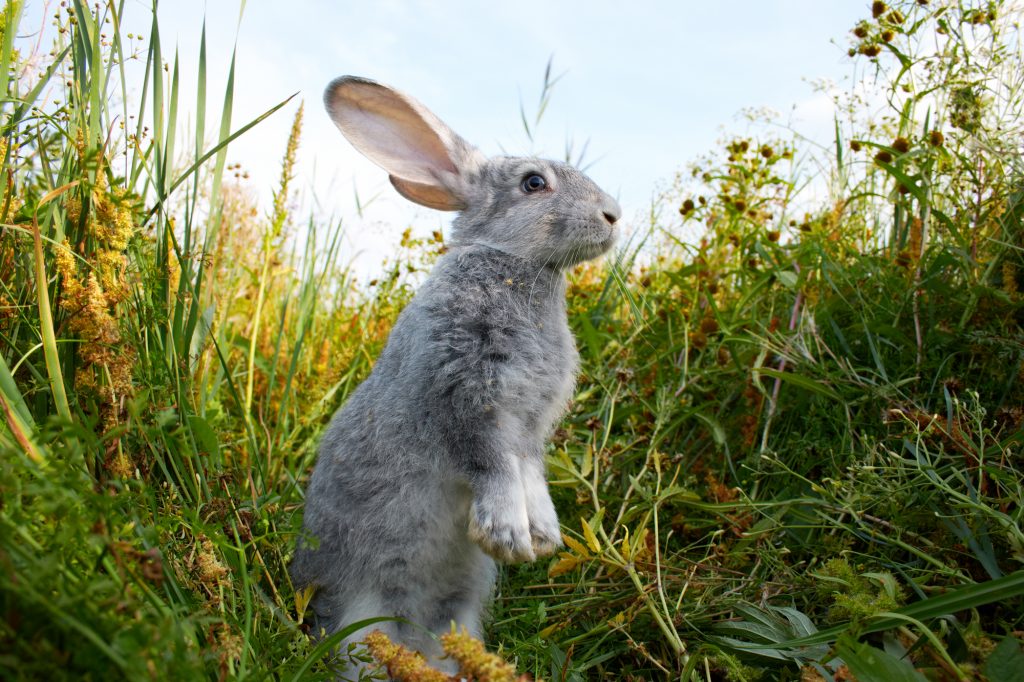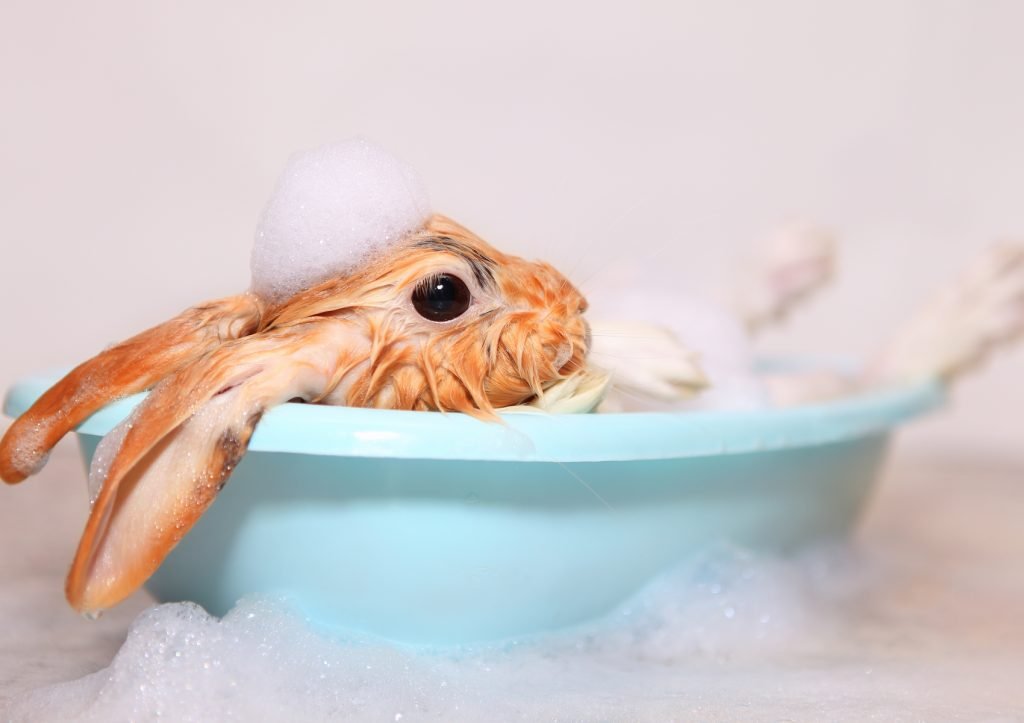Although social media can depict images of some rabbits lying on the backs in the water, seeming having a good time, the truth is that isn’t the case for most rabbits. Generally, rabbits do not like water or swimming. Although rabbits can swim if necessary as a survival tactic it wouldn’t be most rabbits’ idea of a good time.
This article will dive into the question do rabbits like water, and provide more background on why most rabbits don’t enjoy a good dip.
So, Do Rabbits Like Water?
Rabbits do not like water; biologists consider them to be a water adverse species. Some rabbits may go against the grain and enjoy a splash, but the majority of rabbits dislike being in water. Placing rabbits in water can be traumatic for them and in extreme instances cause death.
Why Don’t Rabbits Like Water?
Rabbits Aren’t Natural Swimmer
Rabbits are not natural swimmers. Apart from the Marsh and Swamp rabbits that seem to enjoy a good romp around in the water, most rabbits only approach water for drinking purposes.
They are very much land lovers, living high and dry in their safe burrows. Your domesticated pet rabbit is not a Marsh or Swamp rabbit descendent and therefore will not have their genetic pre-disposition to watery living.
Swimming and being submerged in water are not part of a rabbit’s natural activities. Rabbits are not adapted to swimming or spending time in the water as part of day-to-day survival.
In the animal kingdom, all adaptations and evolutionary acts are to assist the animal to better survive and thrive in their environment.
The rabbit has no real need to be a good swimmer or spend time in the water as this does not provide them with a food source or general protection.
Their Coat Isn’t Made For The Water
A rabbit’s coat is also not adapted to being drenched in water and not only does this make swimming tedious with the extra water weight, but it also tends to take a very long time to dry.
A wet coat can cause several diseases for rabbits, and therefore instinctually, they’ll avoid getting soaked.
Water Is Often Associated With A Traumatic Experience
Many rabbits don’t have a positive association with water. This is because in the wild, rabbits would typically avoid large bodies of water unless they were to fall into the water or be chased by a predator into the water.
Both these scenarios would be traumatic!
Therefore a rabbit is likely to be programmed to associate water with duress. Accordingly, water symbolizes risk and danger to a rabbit, not pleasure. This is why most rabbits react accordingly by panicking when submerged in water.
Of course, there will always be anomalies of rabbits that love the water; but your rule of thumb with bunnies is that they go together with water about as well as oil does.
Do Some Rabbits Like Water?
Nature can always be unpredictable and there are definitely rabbits out there that do enjoy water.
As mentioned previously, the marsh and swamp rabbit have adapted to water in the wild, but domestic breeds do not come from either of these rabbits.

There is no particular domestic breed that is more inclined to enjoy water fun. Ultimately, it is depends on your individual rabbit’s personality and if they have had more positive or negative experiences with water.
Under no circumstances should you throw your rabbit into any water to see if they like it or not.
If you think your rabbit might be a water lover, there are a few gentle steps you can try to see how they react without traumatizing them for life.
Step 1: Initial Test
Start by introducing mist into your rabbit’s hutch. If your rabbit seems unphased, then proceed onto the next test, but if the mist appears to be bothering your pet don’t go any further.
Also, if your rabbit hates being spot cleaned with a wet cloth, you can be sure that it will hate being in water much more.
Step 2: Shallow Water
If the mist didn’t bother your rabbit, you can present it with a shallow body of water, such as a bowl. Do not add any chemicals to the water as rabbits have sensitive skin.
Allow your rabbit to explore the bowl by itself without your encouragement. If the water seems to pique your rabbit’s interest and they are interacting with the water, you can move on to step 3.
Step 3: Slightly Increase The Amount Of Water
Lastly, try slightly increasing the size of the vessel holding the water. Don’t go from a bowl to a kiddie pool!
Try a bigger bowl then gradually increase the size if your rabbit reacts positively.
If your rabbit now chooses to ignore the vessel of water, it’s likely it was merely curious about the bowl but has no interest in being wet.
However, if you find your rabbit hopping in and having a splash, you probably have a water bunny.
You can consider purchasing a pet paddling pool for your rabbit but continue to monitor their relationship with water.
If at any point your bunny seems on edge, it is best to remove the water and not force any interaction with water in the future
It is essential to dry your rabbit whenever it has been playing in water as wet coats can lead to hypothermia.
Can Rabbits Swim?
There is nothing that prohibits a rabbit from swimming. Rabbits would not be considered strong swimmers, but they do have the instinctual reaction to kick their legs when placed in liquid.
For most rabbits, they are able to swim purely to prevent drowning if they find themselves accidentally in water.
The activity of swimming is on a whole very distressing to most rabbits, and although they can swim, they would choose not to.
What Are The Dangers Of Putting Your Rabbit In Water?
Despite those few unusual fellows, rabbits are not designed for water. Placing a rabbit in water, even for a bath, can be traumatizing.
One of the pros of owning a rabbit is that rabbits are methodically clean animals and rarely if ever require a bath. Except in the rare cases where have soiled themselves or have managed to get something sticky in their coats.
If you can, it is preferable to dry clean them with corn starch and a comb. In only the worst circumstances, you can give your rabbit a “butt bath”, but you need to be cautious not to cause them anxiety.
Because most rabbits do not like water, submerging them for a bath can be an incredibly stressful experience for them. The shock of going into the water can be so stressful that it causes them to die from gastrointestinal stasis or a heart attack.
The panic of the bath could also cause them to thrash, not only potentially resulting in deep scratches for you but could land them with a fractured limb or, worse, spine.
Those adorable videos of bunnies lying calmly on their backs in baths are not adorable in the least. When a rabbit rolls onto its back and becomes motionless, this is actually a state called tonic immobility, or colloquially referred to as “playing dead”.
A rabbit will only do this when it is in the most intense, heightened level of fear. You could say it is the most literal form of being scared to death. It is an involuntary response for a rabbit and is not an agreeable one.
Why Shouldn’t Your Bunny Get Wet?
One of the key problems with a rabbit in water is its thick, super-absorbent coat.
It takes a very long time for a rabbit’s fur to dry, which puts them at risk of hyperthermia, pneumonia, and respiratory infections.
Other concerns would be:
- Ear infections
- Parasitic infestations from wet fur such as fly-strike
- Skin rashes and infections
Conclusion
The vast majority of rabbits don’t like the water. Thus, being placed in water can be a very traumatic experience for them so a rabbit should never be placed in a large body of water unwillingly even for a bath.
There will always be exceptions to the rule and there are some bunnies that will actually like splashing in water from time to time. However, water and bunnies typically don’t mix.

